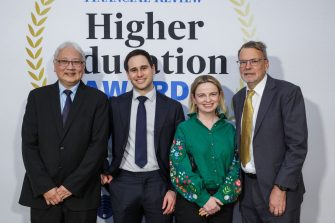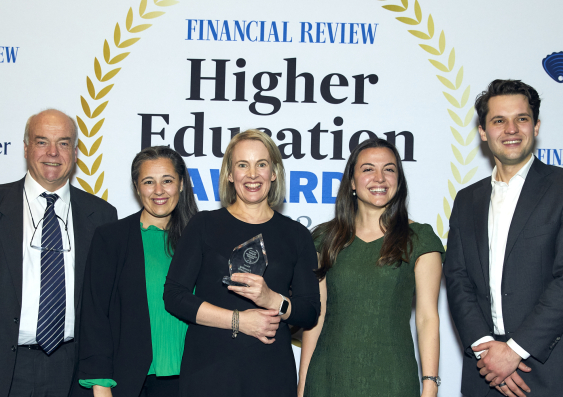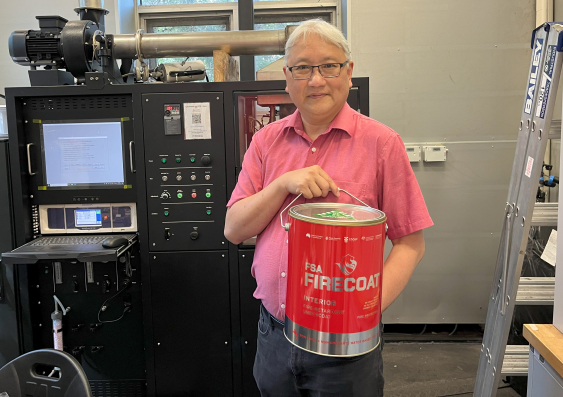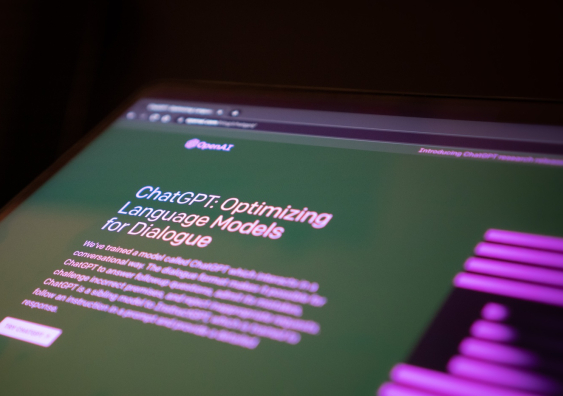UNSW Sydney claims two prizes at 2024 AFR Higher Education Awards
2024-08-21T09:58:00+10:00

Professor Guan Yeoh, Dr Jake Renzella, Dr Sasha Vassar and Dr Andrew Taylor.
Seal Media
Engineering academics were awarded the Teaching and Learning Experience and Research Commercialisation categories at a ceremony in Sydney last night.
Trailblazing academics from UNSW Sydney have taken out two categories at the 2024 AFR Higher Education Awards.
Doctors Jake Renzella, Andrew Taylor and Sasha Vassar from the School of Computer Science & Engineering won the Teaching and Learning Excellence category for their innovative and scalable computing curriculum. Meanwhile, Professor Guan Yeoh from the School of Mechanical & Manufacturing Engineering was joint winner in the Research Commercialisation category for developing the world’s first fire-retardant paint.
The AFR awards are designed to highlight the tremendous contribution that the higher education sector makes to Australian prosperity and quality of life.
UNSW Vice-President, Societal Impact, Equity and Engagement, Professor Verity Firth, congratulated the winning teams on their success.
“The achievements of these outstanding academics exemplify the University’s relentless pursuit of excellence and make me very proud to work at UNSW.
“The Computer Science & Engineering team’s creative and intelligent solutions to educate growing numbers of students to help meet the nation’s need for more workers in this space – without compromising on quality teaching – are outstanding.
“And Prof. Yeoh’s genius fire-retardant paint is poised to protect countless homes from the devastating effects of bushfires in Australia and potentially across the world.
“I congratulate these teams for their innovative solutions which are having a positive impact on the world around them,” Prof. Firth said.
Educating Australia’s next generation of highly skilled computer scientists at scale
Winner – Teaching and Learning Experience
The National Skills Commission’s Employment Outlook shows computer science is one of the fields expected to see significant employment growth over coming years.
Dr Jake Renzella, Director of Studies, Computer Science, at UNSW’s School of Computer Science & Engineering, said Australia’s next generation of computer scientists would face an increasingly challenging socio-technical environment, and universities needed to keep pace as they train high-skilled, job-ready graduates.
“Our first-year subject ‘Programming Fundamentals’ is the largest undergraduate course at UNSW and among the largest computing courses in Australia. Annual enrolments more than doubled between 2017 and 2023,” Dr Renzella said.
Programming Fundamentals introduces students to the foundations of computer science, including the long-established, heavily used and complex C programming language.
“C is notoriously difficult to learn and teach. Over the years, many institutions have moved away from teaching it as the first programming language because of its complexity. However, it is the best introduction to the fundamentals of programming, which is why UNSW – along with other leading universities such as Harvard and NYU – continues to teach it as a first-year subject,” Dr Renzella said.
Determined to ensure that academic rigour and student experience were maintained as demand for the subject increased, Dr Renzella, along with colleagues Dr Andrew Taylor and Dr Sasha Vassar, set about creating an innovative and scalable computing curriculum.
Dr Andrew Taylor took a standard C compiler – a tool that takes a programmer’s source code and turns it into a format the computer can execute – and customised it to provide feedback that students can easily understand. By simplifying common beginner programming errors, the team’s ‘Debugging C Compiler (DCC)’ makes the C programming language more accessible to novices.
Dr Vassar said the tool had increased error detection by up to 65% since it was deployed in 2017, and in doing so had significantly improved students’ understanding of core programming concepts.
“It has also reduced students’ frustration, especially because it’s accessible 24/7, so they don’t have to wait until the next day – or longer – to seek help from their teachers,” she said.
Since its introduction to the UNSW, the DCC has been used an estimated 50 million times.
The team enhanced the tool in 2023 with the integration of OpenAI’s large language models, enabling it to generate bespoke error explanations specific to the student.
The tools are not intended to replace teachers but to provide scale, support and the ability for students to move past roadblocks at times when no human help is available. Teachers can see when students are using the tool too frequently and check in with them, to ensure it’s not impeding their learning.
“We are quick to provide human help and to remind them they won’t have access to the tool come exam time,” Dr Renzella said.
Over the past 12 months, the enhanced DCC has provided students with educationally-sound, AI-generated help almost 450,000 times.
Through innovative tools like DCC, UNSW is shaping the future of computing education – preparing a growing, yet skilled cohort of students poised to lead as the next generation of Australia's computer scientists.
World’s first fire-retardant paint to protect Australian homes
Winner – Research Commercialisation
Increasingly, Australia’s extreme weather conditions – and the frequency of intense natural and man-made fires – are major risks to new and existing homes in bushfire-prone areas.
Professor Guan Yeoh, from UNSW’s School of Mechanical & Manufacturing Engineering, led the team that spent nearly five years perfecting a formula to create a fire-resistant paint, which could save countless properties and help to prevent the spread of bushfires.
The paint is an advanced, non-toxic, ‘supercharged’ bushfire resistant paint, that will better safeguard homes and minimise the exposure of people and assets to fire threats, while not posing its own risks to human health or the environment.
Prof. Yeoh, who is director of the Australian Research Council’s (ARC) Training Centre for Fire Retardant Materials and Safety Technologies and the ARC Research Hub for Fire Resilience Infrastructure, Assets and Safety Advancements at UNSW, said the paint could help prevent bushfires from spreading, because it protected buildings from burning down.
“If a building is not protected in any way and it starts to burn then it can become a source of heat for the fire to continue, like a chain reaction.
“But our paint contains chemicals that produce a thick layer of char, which acts as an insulating barrier to deflect heat. The dense and compact char layer can adhere to any surface. Testing has shown that once this char is wiped away, it leaves the structure underneath virtually undamaged,” Prof. Yeoh said.
The paint was developed and commercialised with industry partner Flame Security International and was partially funded via a $3 million Cooperative Research Centres Projects (CRC-P) grant from the Australian government. It recently passed a stringent Australian standard BAL-40 test that simulates a bushfire attack, meaning it’s proven to provide increased protection against bushfires in areas prone to extreme fire conditions.
Commercially branded as FSA FIRECOAT, the paint is manufactured locally, and is sold in 300 Bunnings stores throughout Australia. It’s also attracting international attention and discussions are underway with potential overseas buyers, providing a huge opportunity to demonstrate why FSA FIRECOAT will be a game changer in fire protection strategies.
Prof. Yeoh shared the prize with Professor Michael Kassiou from the University of Sydney.
Full coverage of the Awards can be found on the AFR website.
Media enquiries
For more information or to arrange interviews please contact Louise Templeton
Tel: +61413495994
Email: louise.templeton@unsw.edu.au


.jpg)




